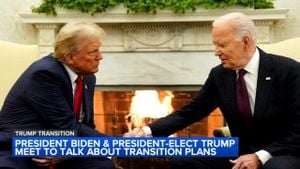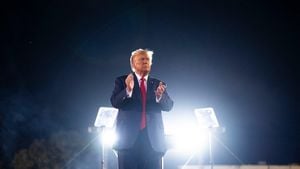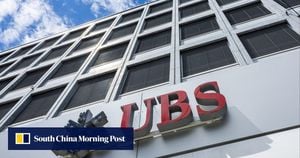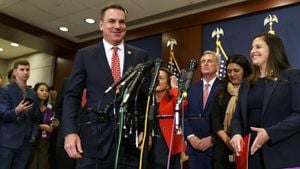New York City's plan for congestion pricing is gearing up for its much-anticipated relaunch, with Governor Kathy Hochul proposing a new base toll of $9 for passenger vehicles entering Manhattan. This decision marks a significant reduction of about 40% from the originally planned $15 toll, previously approved by the MTA before the program was abruptly suspended this past June. Operators within the Metropolitan Transportation Authority (MTA) assert this plan will generate roughly $15 billion needed for major infrastructure repairs, making it not just economically sensible, but also sensible for the city’s congested streets.
Hochul aims to officially launch the new toll system on January 5, 2025, depending on the completion of various regulatory processes, which include federal approval. "We have to act quickly," Hochul stated, referring to the urgency of implementing the toll structure before potential changes with the incoming administration led by President-elect Donald Trump, who has previously vowed to dismantle the tolls. Reimplementation discussions have stirred the pot not just within New York, but also across the political divide, especially with Republican leaders expressing sharp opposition to the program.
The $9 congestion toll would apply to most vehicles entering Manhattan’s congestion zone, which stretches from 60th Street downward—one of the busiest parts of the city plagued with traffic snarls daily. The new tolling structure includes exemptions for certain emergency vehicles, government buses, and those making less than $50,000 annually, who could receive discounts. An additional perk for those traveling late—after 9 p.m.—is even lower rates, but the specifics of these discounts are still being finalized.
While support for the new toll has been highlighted by its reduced price, skepticism remains. Lawmakers like Assembly Member David Weprin are unconvinced, stating, "The difference between $15 and $9 is not significant." Weprin argues it’s still too high for many working-class New Yorkers already burdened by inflation. Critics argue the recent cut, albeit beneficial, is merely tinkering around the edges of affordability for families and commuters.
Continuing on the topic of affordability, some transit advocates have welcomed the new toll as potentially effective for reducing congestion. Justin Balik, from the environmental advocacy group Evergreen Action, mentioned the importance of swift implementation. "They should be able to stand this up relatively swiftly," he remarked, alluding to previous studies showing the environmental benefits of congestion pricing, both for the air quality and the overall health of city residents.
Turning the clock back to when congestion pricing first gained traction, the program was initially signed off by lawmakers back in 2019. Since then, it has become entwined with various political narratives and electoral gamesmanship. This past election, some Democratic leaders even prompted Hochul to pause the pricing initiative to avoid backlash during tightly contested races, underscoring the intersection of policy and politics.
The tolling plan’s revival is viewed by many as proactive—not just financially but also environmentally. The congestion pricing is regarded by some as not merely a cash grab, but as part of broader goals to reduce traffic and air pollution. With the projected revenue allocated toward improving the underwhelming infrastructure of the MTA, supporters feel it could mean fewer delays, fewer buses stuck in traffic, and more reliable services.
On the flip side, local Republicans have mobilized against the plan, writing letters urging Trump to rescind the federal approval needed for the pricing to take effect. Citing concerns for New Yorkers’ financial strain and the imposition of what they term tyrannical taxes, they maintain there is little evidence demonstrating congestion pricing will yield the benefits proponents claim.
"Congestion pricing is the latest tax pushed forward at the expense of New York families and workers," stated the group of Republican congressmembers, as they positioned themselves firmly against Hochul’s initiative. The potential hardship and deflection from Trump's potential presidency raises doubts about the longevity of the tolling approach if implemented. It could very well face legal challenges even before it gets rolling.
With the dust settling from the election, Hochul is now faced with garnering broad support for the tolls. Public opinion appears split, showcasing substantial skepticism and concern among some constituents who feel the economic pinch. The governor's office sees itself at a pivotal moment, claiming the new tolls are necessary to revitalize the subway systems, which have been financially hobbled for years due to lack of adequate funding.
"I’m proud to announce we have found a path to fund the MTA, reduce congestion and keep millions of dollars in the pockets of our commuters," Hochul emphasized. Yet, as her team prepares for announcements next week, there's uncertainty about how this will be received by many who depend on their vehicles and feel the new financial burden will only exacerbate their current challenges of living and working within one of the country’s most densely populated urban centers.
The government’s strategy hinges not only on revenue generation, but also on effective public messaging to reframe congestion pricing as necessary for healthy urban living, superior transit options, and cleaner air. Hochul's forthcoming announcement detailing additional funding sources, including ideas floated about potential tax hikes, may help quell concerns. While the clock ticks away toward the anticipated rollout, the city continues to wrestle with public sentiment.
On social media, the discourse of congestion pricing has sparked dialogues around urban sustainability and the future of public transportation. Some residents applaud the initiative as pivotal to modernization and environmental accountability; others express outrage at what they perceive as punitive taxation against working individuals trying to navigate their daily lives.
Examples from other cities worldwide where congestion pricing has demonstrated beneficial impacts provide Hochul's administration with case studies on how to implement and communicate the changes effectively. With transportation officials studying best practices from global counterparts, there lies potential for NYC to make strides toward reducing vehicular congestion and improving public transit reliability.
Looking to the future, New Yorkers are faced with the potential implementation of the congestion pricing plan right as uncertainty looms over potential federal pushback. Will the incoming administration leverage its influence to strike down the program, or has the state legislature fortified itself against such efforts? The coming weeks and months are sure to provide clearer answers.
Overall, the tension surrounding the congestion pricing debate reflects larger issues within urban policy, the balance of equitable taxation, and the expeditious push for modern transit solutions amid economic uncertainties. Whatever the outcome, it’s clear New Yorkers will be closely watching.



